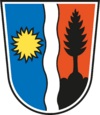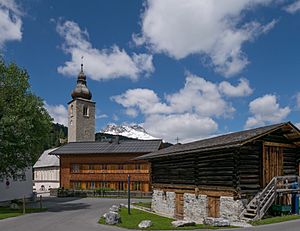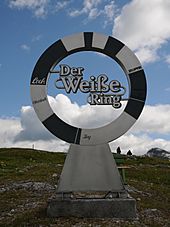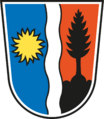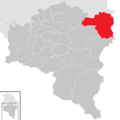Lech (Vorarlberg) facts for kids
Quick facts for kids
Lech
|
||
|---|---|---|
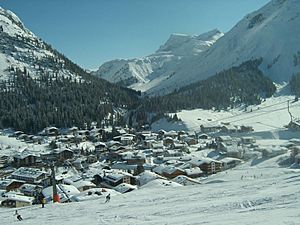 |
||
|
||
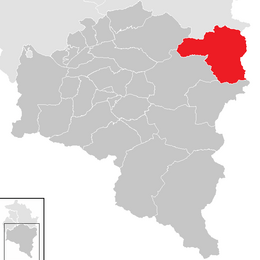
Location in the district
|
||
| Country | Austria | |
| State | Vorarlberg | |
| District | Bludenz | |
| Area | ||
| • Total | 90.03 km2 (34.76 sq mi) | |
| Elevation | 1,444 m (4,738 ft) | |
| Population
(2018-01-01)
|
||
| • Total | 1,568 | |
| • Density | 17.416/km2 (45.108/sq mi) | |
| Time zone | UTC+1 (CET) | |
| • Summer (DST) | UTC+2 (CEST) | |
| Postal code |
6764
|
|
| Area code | 05583 | |
| Vehicle registration | BZ | |
| Website | www.gemeinde.lech.at | |
Lech am Arlberg is a beautiful mountain village in western Austria. It's a very famous and fancy ski resort located in the state of Vorarlberg, right by the Lech river.
Lech is known for its amazing winter sports. It's a popular spot for wealthy visitors, including royalty from other countries. The village is part of an important group called "Best of the Alps," which includes 12 top mountain resorts.
Contents
Where is Lech Located?
Lech is a mountain village that sits at an altitude of 1,444 meters (about 4,738 feet) above sea level. This measurement is taken from the old church in the village. Most of the area around Lech is made up of mountains and forests.
Even though it's part of the Bludenz District, Lech is found in the Arlberg mountain range. The Lech river actually starts in this area. Two smaller rivers, the Formarinbach and Spullerbach, join together to form the Lech river, which then flows through Tyrol and into Bavaria.
A Brief History of Lech
Lech was first mentioned way back in the year 642. The village was settled in the early 1200s by people called Walsers. They came from a region in Switzerland called Wallis. For a long time, the village was known as "Tannberg." Later, its full name, "Tannberg am Lech," was shortened to just "Lech."
The church of St. Nicholas, built around 1390, was very important. It served as the main church for the Tannberg area. There was even a local court in Lech until 1806. During the Napoleonic Wars, Lech was briefly part of Bavaria.
Before the late 1800s, people in the Arlberg region mostly worked as farmers, raising dairy cows and cattle. But then, the Arlberg Railway arrived, bringing the first tourists and a new sport: skiing!
For many years, it was hard to reach Lech in winter because of heavy snow and avalanches. The amazing Flexen Road was built to connect Lech with other villages like Stuben and Zürs. This road took five years to build and made travel much easier and safer.
The first ski school in Lech opened in 1925. Back then, there were only two teachers, and students had to walk up the mountain to ski down! In 1939, Lech got its first ski lift.
Over the past few decades, Lech has grown a lot, thanks to winter tourism. More recently, summer tourism has also become popular. Today, Lech and Zürs have over 1,600 residents. They welcome about a million overnight stays each year. To protect nature and keep the quality high, the number of beds for tourists is limited to 10,000. Since 1997, the Oberlech area has been car-free to help protect the environment.
What is the Weather Like in Lech?
Lech has a cold climate with snowy winters and cool summers. The heavy snowfall in winter is what makes Lech such a popular place for skiing.
| Climate data for Lech, Vorarlberg (1440 m; average temperatures 1982 – 2012) Dfc, bordering on Dfb. | |||||||||||||
|---|---|---|---|---|---|---|---|---|---|---|---|---|---|
| Month | Jan | Feb | Mar | Apr | May | Jun | Jul | Aug | Sep | Oct | Nov | Dec | Year |
| Mean daily maximum °C (°F) | −0.7 (30.7) |
0.3 (32.5) |
3.5 (38.3) |
7.1 (44.8) |
11.8 (53.2) |
17.4 (63.3) |
16.8 (62.2) |
14.3 (57.7) |
15.1 (59.2) |
9.7 (49.5) |
3.7 (38.7) |
0.1 (32.2) |
8.3 (46.9) |
| Daily mean °C (°F) | −4.5 (23.9) |
−3.7 (25.3) |
−0.6 (30.9) |
2.9 (37.2) |
7.3 (45.1) |
10.6 (51.1) |
12.7 (54.9) |
12.2 (54.0) |
9.9 (49.8) |
5.6 (42.1) |
0.4 (32.7) |
−3.3 (26.1) |
4.1 (39.4) |
| Mean daily minimum °C (°F) | −8.2 (17.2) |
−7.6 (18.3) |
−4.7 (23.5) |
−1.3 (29.7) |
2.8 (37.0) |
6.0 (42.8) |
8.0 (46.4) |
7.7 (45.9) |
5.6 (42.1) |
1.6 (34.9) |
−2.9 (26.8) |
−6.6 (20.1) |
0.0 (32.1) |
| Average precipitation mm (inches) | 59 (2.3) |
54 (2.1) |
56 (2.2) |
70 (2.8) |
103 (4.1) |
113 (4.4) |
133 (5.2) |
136 (5.4) |
95 (3.7) |
67 (2.6) |
78 (3.1) |
66 (2.6) |
1,030 (40.5) |
Fun Things to Do in Lech
Lech is a top spot for skiing and other fun activities. Many world and Olympic ski champions come from here!
Skiing and Snowboarding
Lech is famous for its skiing, both on marked trails (on-piste) and off-trail (off-piste). It's connected by lifts and groomed slopes to nearby villages like Zürs, St. Christoph, St. Anton, Stuben, Warth, and Schröcken. All these villages are part of the Arlberg region, which is where modern Alpine skiing began. This area is one of the biggest connected ski resorts in Austria and Europe!
Lech is also the start and end point for The White Ring. This is a famous circle of ski runs and lifts. It's a popular tour and hosts an annual race with 1,000 skiers. At 22 kilometers (about 13.7 miles), it's considered the longest ski circuit in the world!
The movie Bridget Jones: The Edge of Reason even filmed some of its mountain holiday scenes in Lech.
FIS Alpine World Ski Championships
The Lech-Zürs ski area has hosted many important FIS Alpine World Championship races. Here are some of the past events:
- November 2021: Parallel races for men and women.
- November 2020: Parallel race for men and slalom for women.
- January 1988: Super-G race for women.
- November 1991: Two slalom races for women.
- January 1993: Slalom and combination races for men.
- December 1993: Super-G race for men.
- December 1994: Two slalom races for men.
The Audi FIS Ski World Cup races were moved to November 26 and 27 in 2020 because there wasn't enough snow earlier. The next big ski races in Lech are planned for November 10 and 11, 2023.
Ski Arlberg Area
The Ski Arlberg area is huge! It has 350 kilometers (about 217 miles) of groomed slopes and 200 kilometers (about 124 miles) of marked touring slopes. About 63% of the slopes can be covered with artificial snow if needed. There are 97 lifts and cable cars that can carry 123,600 people per hour. Lech and Oberlech alone have 23 lifts and many ski runs.
Since 2013, a gondola lift called the Auenfeldjet has connected the Ski Arlberg West area with Snowworld Warth-Schröcken. In 2016, the Flexenbahn lift closed the last gap, making it the largest connected ski area in Austria! It has 88 lifts and 304 kilometers (about 189 miles) of pistes.
The Langer Zug piste (ski run number 215) is one of the ten steepest groomed ski runs in the world!
Heliskiing
Lech is the only place in Austria where heliskiing is allowed. This is when a helicopter takes skiers to remote mountain tops for off-piste skiing. The main landing spots are on the Mehlsack mountain and near the Orgelscharte. Heliskiing is not allowed on weekends or public holidays. There has been some debate about whether heliskiing should continue because of its environmental impact.
Mountain Biking
In summer and autumn, Lech is a great place for mountain biking. Famous routes like the Heckmair and Joe Transalp trails pass through the village.
Hiking
Hikers can explore the beautiful mountains around Lech on trails like the Lechquellenrunde and Robert Bosch Trail. Many hiking trails can be reached using the lifts that are open in summer, or by special hiking buses. There are also several mountain huts where hikers can rest or even stay overnight.
Culture and Events
Even though Lech is super popular in winter, it also offers many fun things to do in summer, including sports, cultural events, and great food. There are many fancy hotels and top-notch restaurants in Lech.
A famous writer named Ludwig Bemelmans, who wrote the "Madeline" books, even set his 1949 novel The Eye of God in a fictional version of Lech.
Interesting Places to Visit
- The church of St. Nicholas: This church was built in the Gothic style around 1390. It was updated in 1987. Inside, you can see beautiful Rococo designs from 1791 and older Romanesque paintings. The church has a tall, 33-meter (108-foot) tower with a unique onion-shaped dome. Its oldest bronze bell dates back to the early 1500s.
- The historic Huber House: This house was built in 1590 and is now a museum. It shows how people used to live and work in the region, with a traditional kitchen and workshop.
- "Horizon-Fields": These were life-sized human sculptures created by artist Antony Gormley. One hundred of them were placed in the mountains around Lech. Most were removed in 2012.
- The Green Ring: This is a three-day hiking tour around Lech-Zürs. Along the trail, there are 35 art installations that tell stories about local people and culture. It's a project that combines art and literature.
- The Skyspace Lech: This is a special art installation by James Turrell. It's an enclosed space with a large opening in the ceiling, allowing visitors to look at the sky. People can watch the changing light colors on the walls and the sky during sunrise and sunset. It opened in 2018.
Regular Events in Lech
- The White Ring (Der Weiße Ring): This is known as the longest ski race in the world! It covers 5,500 meters (about 3.4 miles) of altitude and 22 kilometers (about 13.7 miles) of ski runs. The first race was held in 2006. The current record for finishing the race is 44 minutes and 10.75 seconds, set in 2010 by Markus Weiskopf.
- Philosophicum Lech: This is a yearly meeting where people discuss ideas about philosophy, culture, and society. A special prize called the Tractatus is given to the best scientific essay.
- Medicinicum Lech: This is a public event focused on health and nutrition topics.
- Arlberg Classic Car Rally: Every year, about 120 classic cars from 1908 to 1973 go on a three-day tour between Arlberg and Zugspitze. It's like a moving museum! The rally starts in Lech and goes through the Flexenpassgalerie, remembering the amazing work of the old road builders.
- Literaricum Lech: This literary festival started in July 2021. Each year, it focuses on a famous piece of world literature. For its first year, it explored "Simplicius Simplicissimus," one of the oldest bestsellers in the German language.
Famous People from Lech
- Gerhard Nenning (1940-1995), an Alpine ski racer.
People Who Lived in Lech
- Trudi Beiser, an Olympic and world skiing champion from the 1940s and 1950s.
- Othmar Schneider, an Olympic skiing champion from the 1950s.
- Egon Zimmermann, an Olympic and world skiing champion from the 1960s.
- Patrick Ortlieb, an Olympic and world skiing champion from the 1990s.
Partner Cities
Lech has special connections with other cities around the world:
 Beaver Creek Resort, Avon, Colorado, United States of America
Beaver Creek Resort, Avon, Colorado, United States of America Kampen, Sylt, Germany
Kampen, Sylt, Germany Hakuba, Happo, Japan
Hakuba, Happo, Japan
Lech in Books and Movies
- The thriller An Exchange of Eagles by Owen Sela is set in a fictional Lech. In the story, a group tries to assassinate Adolf Hitler during his stay at the resort in 1940.
- The detective novel Crossed Skis - An Alpine Mystery by Carol Carnac takes place in London and Lech. It's about a group of English skiers.
- Lech was one of the places where the 2004 movie Bridget Jones: The Edge of Reason, starring Renée Zellweger, was filmed.
Images for kids
See also
 In Spanish: Lech am Arlberg para niños
In Spanish: Lech am Arlberg para niños


